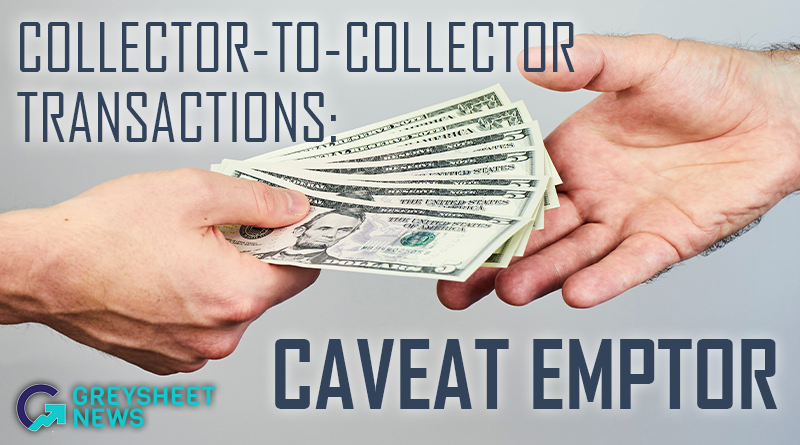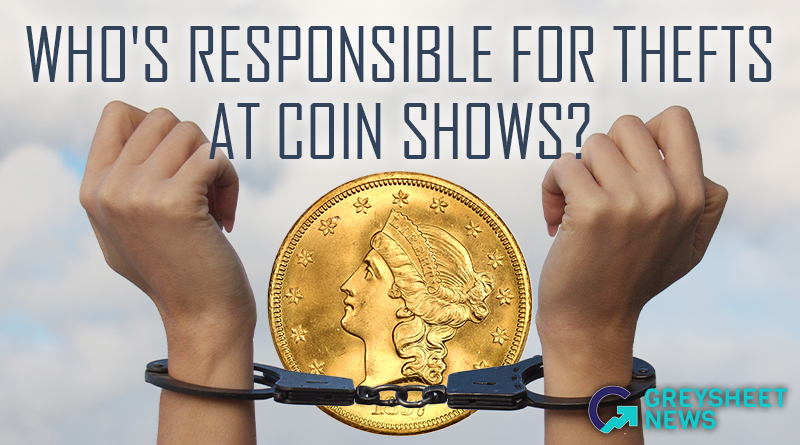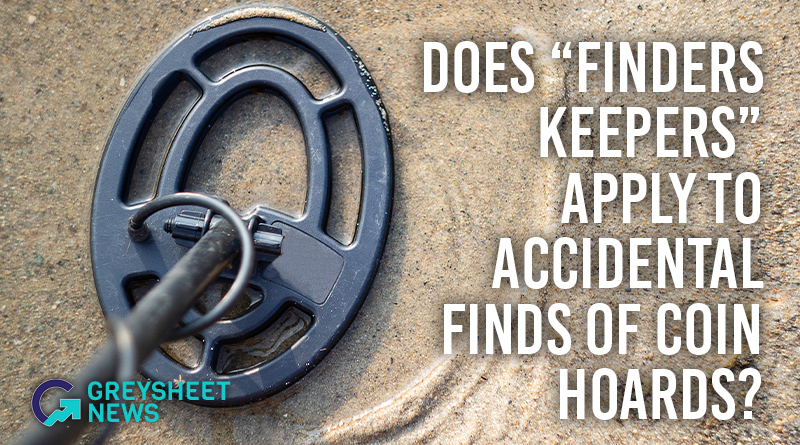Does “finders Keepers” Apply To Accidental Finds Of Coin Hoards?
In the U.S., the law relating to “found” items is regulated by each state, but certain principles are consistent.
We’re familiar with coin finds such as The Saddle Ridge Hoard and the Kentucky Civil War Hoard. The Saddle Ridge coins were found by a couple near a tree on their own property, and the Kentucky coins were found by a metal detectorist on someone else’s property. Obviously, these finders were not the people who originally placed the coins there. Why is it that both got to keep the coins and, eventually, sell them?
In the U.S., the law relating to “found” items is regulated by each state, but certain principles are consistent. Items are either mislaid, lost, abandoned or “treasure trove”. A wallet that falls to the ground out of someone’s pocket is mislaid, because the owner never intended for the wallet to be where it was eventually found. A wallet left on the counter at a grocery store is considered lost, because the owner did originally intend for it to be there, but later forgot about it. Abandonment comes from lost or mislaid items where the original owner showed an intent not to return to recover them, and “treasure trove” refers to items of intrinsic value which have been lost or mislaid for such a long period of time that it is no longer possible to identify who put them there.
The general principle is that finders of mislaid property have no rights, and the property belongs either to the original owner (referred to by lawyers as the “true owner”) if he or she appears, or otherwise to the owner of the premises where the property is found. For lost property, the finder is entitled to possession against anyone but the true owner, and this more or less is true in the case of abandoned property or treasure trove found on one’s own property.
So the Saddle Ridge finders, who found the coins on their own land, might have had to give up the coins had the “true owner” appeared and made a claim, but nothing like that happened. The coins became theirs.
The Kentucky coins presented a more complicated case, because the coins would be considered as abandoned items or, more probably, treasure trove, and the finder found them on land he didn’t own. In the past, finders were generally awarded ownership of such items unless a true owner appeared, but in recent years the trend has been to award title to the owner of the property where the find took place. The policy behind this was to not encourage and reward trespassers or hired contractors who scour other people’s land but don’t tell anyone if they find something valuable.
A 1985 case from Tennessee is relevant. A metal detectorist found an iron pot full of U.S. $5 gold pieces dated 1861 and earlier on someone else’s property, and the owner of the property sued him to recover the coins. The trial court awarded the coins to the metal detectorist based on traditional legal principles, but the appeals court reversed that ruling and ordered the coins turned over to the property owner. The court recognized that traditionally the finder would get possession of treasure trove, but that: “[W]e find the rule with respect to treasure-trove to be out of harmony with modern notions of fair play. The common-law rule of treasure-trove invites trespassers to roam at large over the property of others with their metal detecting devices and to dig wherever such devices tell them property might be found. If the discovery happens to fit the definition of treasure-trove, the trespasser may claim it as his own. To paraphrase another court: ‘The mind refuses consent to the proposition that one may go upon the lands of another and dig up and take away anything he discovers there…’
Recognizing the validity of the idea that the discouragement of trespassers contributes to a preservation of the peace in the community, we think this state should not follow the common law rule with respect to treasure-trove. Rather, we adopt the rule [from a Texas case]: ‘Where property is found embedded in the soil under circumstances repelling the idea that it has been lost, the finder acquires no title thereto, for the presumption is that the possession of the article found is in the owner of the [land where the property was found]’.”
So under Tennessee law, and Texas law as quoted by the Tennessee court, the landowner would have a superior right of possession to the coins had the metal detectorist found them in one of those states. Likewise, an Idaho court found that several rolls of U.S. gold coins unearthed during a construction project at a ranch belonged to the ranch’s owner: “[T]he modern trend favor[s] characterizing the coins as property either embedded in the earth or mislaid-under which the right of possession goes to the landowner-rather than treasure trove-under which the right of possession goes to the finder. Although accepted by a number of states prior to 1950, the modern trend since then, as illustrated by decisions of the state and federal courts, is decidedly against recognizing the ‘finders keepers’ rule of treasure trove.
Land ownership includes control over crops on the land, buildings and appurtenances, soils, and minerals buried under those soils. The average Idaho landowner would expect to have a possessory interest in any object uncovered on his or her property. And certainly the notion that a trespassing treasure hunter, or a hired handyman or employee, could or might have greater possessory rights than a landowner in objects uncovered on his or her property runs counter to the reasonable expectations of present-day land ownership.”
Kentucky has no reported cases or statutes relevant to this issue, so presumably it still follows the traditional “finders keepers” rule for treasure trove. But even if it didn’t, if the Kentucky metal detectorist had the landowner’s consent to search his property, the courts would support his right to keep anything he found.
What about finds on public land? The issue there isn’t whether you get to keep the coins you find, but whether you’re allowed to dig for them in the first place. Most states restrict metal detectoring, some banning it outright, and others permitting it generally but not permitting the removal of coins 100+ years old. Check carefully to avoid disappointment or worse.

Download the Greysheet app for access to pricing, news, events and your subscriptions.
Subscribe Now.

Subscribe to The Greysheet for the industry's most respected pricing and to read more articles just like this.
Author: Armen Vartian
Related Stories (powered by Greysheet News)
View all news
Although dealers and collectors benefit greatly from “meeting” each other online, it is important to recognize some of the differences a buyer and seller's status confers on their respective legal rights and responsibilities.

Courts have held that a show promoter has no legal duty to protect the property of dealers or collectors on a bourse floor.

It's not always prudent to rely on a verbal confirmations when doing business.









Please sign in or register to leave a comment.
Your identity will be restricted to first name/last initial, or a user ID you create.
Comment
Comments